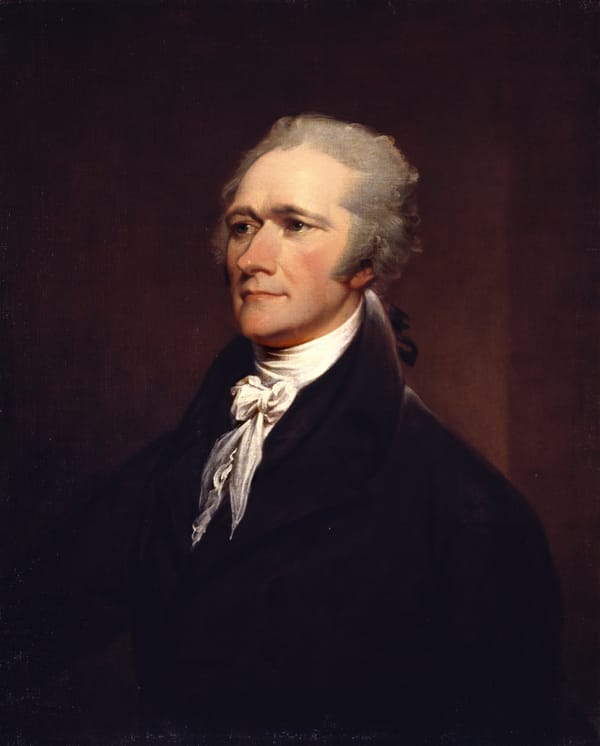Trump is a Usurper
His presidency will be unlawful from top to bottom. He is ineligible to the office of president, or for that matter any other public office state or federal, under Section Three of the Fourteenth Amendment, which forbids those who (1) held public office and took an oath to support the Constitution, then (2) engaged in rebellion or insurrection, thereby (3) breaking their oath from holding office ever again. Trump did all of those things; we saw him to it in plain view of the public. He tried to overthrow the government, to keep himself in power when the People had chosen someone else as president instead. Congress has not lifted this disqualification by a two-thirds vote of each chamber, which is the only method provided. Trump may not lawfully be president, and yet he will be: thus, usurper.
The counter to this is often that the Supreme Court said he's not disqualified under Section Three, so just because some random blogger thinks so doesn't make it so. This doesn't hold, for a few reasons. First, that's actually not what the Court said. All it said was that the states cannot keep Trump off the ballot on the theory that he's ineligible. By its own terms, nothing in Trump v. Anderson would prevent, say, Congress, when it meets to count the electoral votes, from declining to count the ones for Trump on that same theory. (Yes, this would be on January 6th, and yes that would be ironic. It's also what the law prescribes.[1]) What the Court conspicuously did not say is that, as a matter of fact or of law, Trump is not disqualified by Section Three. They pointedly refused to address the merits of that question.
Second, the Court's reasoning in Anderson is plainly gibberish. I'm hardly the first to make this observation. There are a bunch of fairly coherent interpretive choices you could make about Section Three that would lead to something like the same result. You could say, for example, that disqualification strictly requires conviction for rebellion or insurrection under a federal criminal statute. Or that the provision was designed solely for the Civil War of 1861-65, and became a dead letter when the last Confederate official died. Both of those would be wrong, in my view.[2] But they would be coherent.
Instead of that, what John Roberts said is that letting states determine ballot eligibility would invert the "fuck the states" design of the Fourteenth Amendment, that it was designed to restrict the states' power, not enlarge it. But this is nonsense: states obviously have to do the work of ensuring their own compliance with the restrictions imposed by the federal Constitution. Roberts is erring here by focusing too much on decisional authority. Section Three restricts the states' power to put oathbreaking traitors in office, not their power to determine who's an oathbreaking traitor. And those determinations are, of course, subject to appellate review by the Supreme Court, or by a lower federal court if Congress wanted to set up a procedure for it.
But there's also a broader point about the nature of constitutionalism. Those who know me know that I am a big fan of judicial review. But one should not simply reduce the Constitution to "what the courts say." Not only are all of us private citizens entitled to think the courts got it wrong, but other departments of government are entitled, within the scope of their own duties, to operate according to their own view of the Constitution. This is an idea called "departmentalism," and it's not really in conflict with the idea of judicial review; indeed, John Marshall's logic in Marbury v. Madison is entirely the logic of departmentalism.[3] Where their actions are subject to judicial oversight, other government actors are typically well advised to follow judicial precedent. But not everything is amenable to judicial scrutiny; I would give the counting of electoral votes, and the determination by Congress (or whoever) as to presidential eligibility, as a prime example of something that can't be litigated in court. Thus, the fact that the Court has been derelict in its duty to enforce Section Three does not at all excuse Congress of its responsibility to do the same. Of course I am under no illusion about whether it will do so. But a usurper is still a usurper, even if those who were supposed to defend the realm against them fail in their duty.
This, I think, brings us to the deeper reason why people don't see him as a usurper: he won the election. Which is true! Very slightly more people voted for him than for Harris, it wasn't even a bullshit Electoral College win. But here's the thing: this isn't really an answer to the point that he cannot lawfully be president. The entire premise of the American Constitution is that the People may only legitimately act through it, and through the institutions it creates, that an action is not valid simply because a popular majority supported it. This is familiar in the context of something like the First Amendment, which is expressly meant to prevent majorities from persecuting religions or ideas they find distasteful. Why should it be less true of Section Three? Indeed, this is obvious when we think back to the original context of Reconstruction. Section Three was quite plainly meant to stop the Southern states from sending Confederates back to Congress, which they would presumably do with (at least a warped version of) public support.
Is it different when it's a (narrow) majority of the entire nation? The thing is that bare majorities of the national electorate are not meant, as a matter of law, to have the power to change the Constitution. There's a prescribed mechanism for doing that, which is quite a bit more demanding. Now, I'm as much of a critic of Article V as anyone, to say the least. But it's important to understand what we're saying at this point: that Trump's authority does not flow from the Constitution, but rather from an extraconstitutional popular mandate. Which is to say that... he's a usurper. Perhaps a justified one! Sometimes the existing order needs usurping; I'm certainly not of the view that the Constitution is binding for all time even if the People no longer wish to abide by it (and neither were the people who made the Constitution). But you can't really have it both ways. If Trump is the president, then the Constitution is no longer in effect, because the Constitution says that Trump may not be president.
The idea that a majority of the People may do whatever they want, disregarding all existing constitutional forms, and specifically that they can extralegally imbue a single figure with their sovereignty and political identity, is the constitutional theory of Carl Schmitt, the court philosopher of the Third Reich. It is absolutely not the constitutional theory of James Madison. To say that Trump the usurper has the support of the People is only to say that the People have abandoned their foundational legal commitments.
Technically I think the Twentieth Amendment says that they should count the votes for Trump, and then what happens is that on January 20th at noon, when he would otherwise supposed to become president, he would be prevented from doing so by his ineligibility, and then Vance would take office instead. This provision was pretty plainly designed with an eye toward a scenario wherein the president-elect has, say, died, not where they're an oathbreaking traitor. ↩︎
As to the first, it's quite clear that Section Three was not understood to require a criminal conviction during Reconstruction. And the language certainly seems to be self-executing, which would support the conclusion that anyone who has occasion to determine eligibility for public office can, indeed must, consider and determine the Section Three question.
As to the second, they could have written it so as to apply only to the late unpleasantness, and they didn't. There's no real reason to think it's a dead letter. For what it's worth, if I wanted to rule for Trump in the Anderson case, that's probably how I would've done it; I think much of the discomfort people felt with Colorado keeping Trump off the ballot reflects the view that a provision like this doesn't really have a place in contemporary America. ↩︎In other words, that the law courts should, in carrying out their own functions, form their own views as to constitutional questions, rather than being bound by the views of Congress. ↩︎

